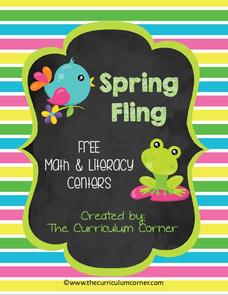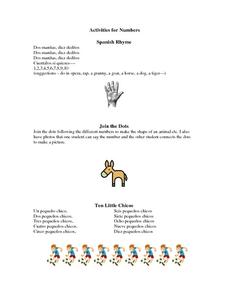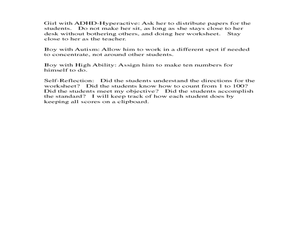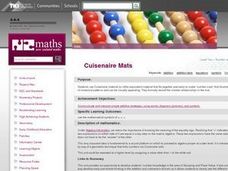Curriculum Corner
Back to School Math and Literacy Centers
From filling in the missing number to filling in the missing letter; to writing fluency sentences to skip counting and matching, a complete set of back to school math a literacy centers will not disappoint. Use these activities during...
Curated OER
Lots of Lakes: Greater Than, Less Than
To set up this activity, your class explores Minnesota's nickname as the Land of 10,000 Lakes, and the back of the state quarter that features a Minnesota lake. Young mathematicians compare the number 1 to the number 10,000 with support...
Curriculum Corner
Spring Fling Math and Literacy Centers
Fling your class into spring with a set of math and literacy center worksheets. Learners will enjoy the variety with sheets that practice multiplication, missing addends, before/after and more/less than number comparisons, as well as...
Nebraska Department of Education
Activities for Numbers
Looking for ideas for teaching numbers to your Spanish class? Try out one or all of these 16 activity ideas!
Curated OER
Degree
A Standardized Test-type of worksheet on grammatical rules of degree awaits your students. They carefully look at ten sentences and focus on the parts of each sentence that is underlined. If the underlined portion has a mistake, they...
Curated OER
Make a Ten
Youngsters mentally perform calculations involving addition and subtraction. They solve various addition and subtraction word problems using mental math and counters, write their own number stories, and solve various examples...
Curated OER
Narrow it Down: Numbers
Elementary learners of all ages utilize their number knowledge by playing a 20 questions style game. They participate in a game in which they ask yes or no questions to a group leader in order to discover which number the leader has...
Curated OER
Albedo and Irradiation of Surfaces
Here is a physical science activity where pupils place thermometers inside of a white and a black paper pocket and place them under a lamp. They record and compare the temperature increase over a ten-minute period. Have your class...
Curated OER
Cat on the Mat Guided Reading Lesson
Young learners participate in a guided reading lesson. They will read the book Cat on the Mat by Brian Wildsmith. The teacher helps provide the group with reading strategies, and provides more one-on-one support during independent...
Curated OER
More, Less or Equal
In this math worksheet, students compare sets and determine how they compare. Students count the size of small sets using the numbers 0 to 20 and identify if the sets are equal in size, larger or smaller.
Curated OER
Name that Number
First graders state numbers from 1 to 100. For this name that number lesson, 1st graders must identify and state 10 random numbers given on a worksheet.
Curated OER
Math - Comparing - Less or More
In this comparing numbers worksheet, learners write a greater than sign, less than sign, or equal sign to compare the pictures or number examples in the 11 examples.
Common Core Sheets
Comparing Fraction Relative Size
Which is the larger amount? Two-fourths of 10 dollars, or one-fourth of 100 dollars? This type of question is the main focus of a activity that has learners comparing fractions by their relative size. Each problem contains two fractions...
Illustrative Mathematics
How Many Cells Are in the Human Body?
Investigating the large numbers of science is the task in a simple but deep activity. Given a one-sentence problem set-up and some basic assumptions, the class sets off on an open-ended investigation that really gives some context to all...
K12 Reader
Adapting to Survive
Life science and language arts come together in a passage about animal adaptation. After kids learn about how organisms adapt to conditions in their environments, they complete five reading comprehension questions based on context clues...
Curated OER
It's About Time
First, second, and third graders explore elapsed time through estimation and prediction. They work with a partner to estimate how long it will take to perform various tasks. One person uses a stop watch to time his or her partner...
Curated OER
Decimal Bingo
Practice converting decimals into fractions. They draw a 3x3 grid and write in any nine common fractions with denominator 10 or 100 and with numerators 9 or less. The group listens as the teacher call out decimal numbers within the given...
Curated OER
If a Runner Runs, Does a Sweater Sweat?
Play with words and word meanings involving the suffix -er. After reading a sample list of words, young readers look up each one in the dictionary to decide which words refer to people, animals, or objects, or have three or more...
Curated OER
Cuisenaire Mats
First graders use Cuisenaire rods to study the mathematical symbols =, <, > for the relationships is equal to, is less than, and is greater than. They use the rods to show visual explanations of common number combinations.
Curated OER
Math Flash Rounding
This PowerPoint reinforces the concept of rounding. Each slide of the PowerPoint contains examples of how to round to the nearest thousand or ten thousand. There are various examples that the students must complete on the final few slides.
Curated OER
Place Value: A Place for Apples
Second graders explore number values by completing math worksheets. In this place value lesson, 2nd graders identify the use of decimals in numbers and read a book about math called Apple Pigs. Students create number charts based on the...
Curated OER
Comparative Structures Worksheet
In this comparative structures worksheet, 1st graders read ten sentences and fill in each blank with as, than or more to complete each comparative structure.
Alabama Learning Exchange
"Nuts" about Peanuts!
Students describe the characteristics of a peanut and peanut butter using their five senses. They record their observations and descriptions on a graphic organizer. They may use the Internet to look up answers to questions about peanuts...
Curated OER
Is Your Order Up or Down?
Students practice ordering numbers. For this number sense lesson, students collaborate to order whole numbers from greatest to least and least to greatest. Students also practice the concept by using educational software.

























